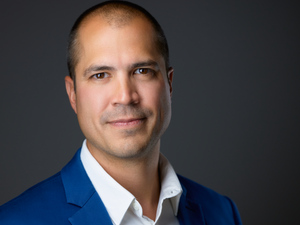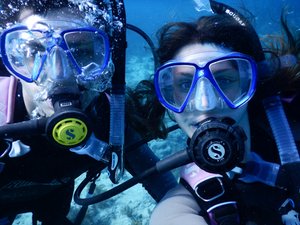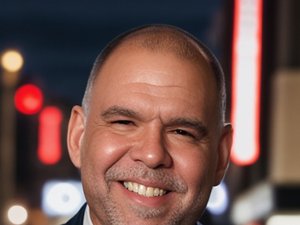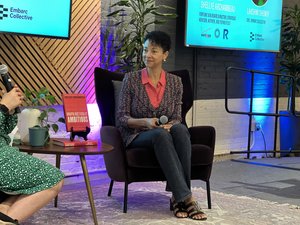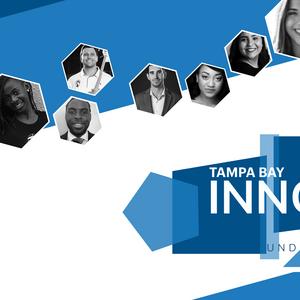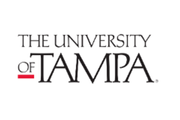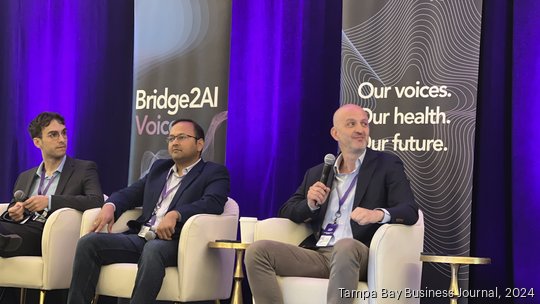
For the second year, Tampa became an international hub for artificial intelligence startups.
The Voice AI Symposium by Bridge2AI — the National Institutes of Health funding entity fueling the Voice as a Biomarker of Health project at the University of South Florida — brought together academics, startups, ethicists, clinicians and advocacy groups to discuss how AI can be used to diagnose disease from the voice.
The event was a source of networking and education. It also offered a convergent look at this industry as it vies to evolve and establish the lesser-known health tech science of vocal biomarkers — and how the Tampa Bay region has gained recognition along the way.
The event’s goal was “to bring all stakeholders invested in voice biomarkers together because working together and talking to each other is what’s going to move the science forward,” said Dr. Yael Bensoussan, a doctor at the University of South Florida and leader in a national effort to study voice biomarkers.
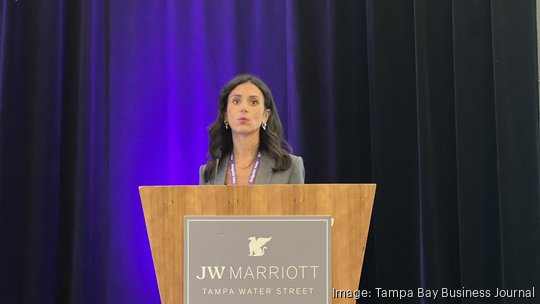
The event hosted 10 startups interested in voice AI, such as Utah-based Canary Speech, St. Petersburg-based Medvise AI, U.K.-based Eupnoos, Netherlands-based Whispp, and Australia’s Laronix, among many other experts and employees in the space. That’s not to mention Big Tech’s perspective, delivered through panelists from Microsoft, Google and advisers to Bill Gates’ executive office.
Although the space is being researched, money is flowing through it. Non-Food and Drug Administration-approved startups — ones seeking to diagnose disease from voice — have raised more than $178 million in venture capital to develop their businesses, according to previous reporting.
Dale Joachim, a vice president at Boston-based voice diagnosis platform Sonde Health, said the technology will be an important part of the future. And with Bridge2AI being centrally focused in Tampa — through Bensoussan’s work — it’s encouraging and stimulating this conversation in the region.
“This conference is unique because it’s led by clinicians, and it came from the NIH,” Joachim said.
It’s good to interact with other companies in the space, but it’s essential to understand clinicians, as other conferences only focus on technology or business.
Julia Hoxha traveled from Berlin to represent German startup Zana, which aims to use the voice to detect health issues. Hoxha is the co-founder and CEO of Zana and holds doctorate degrees in medical informatics and AI. She was curious to see the market for voice AI startups in the U.S., she said.
The space is young, she said. That’s why exploring it and its gaps is important.
“We are pioneers in the field,” Hoxha said. “As we’ve also seen here, there is no device or software ... that is used in clinical practice.”
Nicholas Cummins traveled from London for the conference. He is an AI expert at King’s College, where he explores speech analysis for health. He’s also the chief science officer for a U.K. startup called Thymia, a vocal AI diagnostic firm.
The symposium was a rare occasion to explore the topic in a coordinated, intersectional way.
“I’m interested in voice biomarkers and how we actually get this through into a clinical product that has beneficial change for patients,” Cummins said. “There’s a lot happening in the space, but it’s not particularly coordinated, and this is one of the opportunities to come actually speak to people.”
Ethical and regulatory approval limit these projects, and those limitations were a focus of the event.
Dr. Jamboor Vishwanatha, the principal investigator for NIH-affiliated Aim Ahead, focuses on health disparity research, education and community outreach programs. He said he attended the program to represent Aim Ahead and contribute to the conversation on quality data collection.
Data is what feeds AI models, but it also introduces bias and imperfections. That’s a thorny issue for technology development broadly, but especially in AI medical technologies.
“We want to make sure the data collected with the Bridge2AI is representative to all of our communities, so any application that comes out of the Bridge2AI is applicable to the Caucasian community as much as the African American community,” Vishwanatha said as an example of Aim Ahead’s goals.
Tampa’s two-day event has grown since its introduction last year. Bensoussan hopes to maintain the momentum and further establish the region as a hub for biotech.
“We hope that next year it’ll be even more international and have people from all over the world coming to share their scientific advances because the more we hear from people doing the same thing in different places, the more the science is going to advance,” Bensoussan said.
